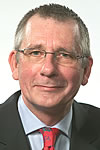Campaign for a single workplace for European Parliament gathers steam
Campaign for a single workplace for European Parliament gathers steam
The Single Seat campaign, which aims to bring to an end the monthly travelling circus that sees the European Parliament decamp en masse from Brussels to Strasbourg, is gathering steam. Yesterday the campaign’s steering group, which includes SP Euro-MP Dennis de Jong, sketched out its plans for the coming elections, as De Jong explains. ‘There is now a clear campaign strategy for the European elections in 2014,’ he says. ‘We are going to ask all candidates to sign a declaration of support for the campaign. As for any candidate who isn’t willing to do so, the public will know at least that he or she wants to stick to the current wasteful travelling circus. More than three-quarters of sitting MEPs want to put an end to it.’
 In addition, the steering group will be working on a concrete proposal for a treaty amendment giving the European Parliament to decide for itself where it meets and where its staff are employed. ‘It’s still the case at the moment that half of the personnel of the EP work in Luxemburg. This too leads to inefficiency and waste,’ says De Jong. Referring to the annual joint meeting of MEPs and national MPs in the national parliament in The Hague, De Jong added that he had ‘a few years ago challenged Prime Minister Mark Rutte during the State of the Union meeting to put some real effort into achieving a single workplace for the European Parliament. The Premier showed little enthusiasm for this at the time. This year, however, he has nailed our colours to the mast and together with a few like-minded government leaders has written requesting that the matter be put on the agenda. So the campaign is being launched at a propitious moment.´
In addition, the steering group will be working on a concrete proposal for a treaty amendment giving the European Parliament to decide for itself where it meets and where its staff are employed. ‘It’s still the case at the moment that half of the personnel of the EP work in Luxemburg. This too leads to inefficiency and waste,’ says De Jong. Referring to the annual joint meeting of MEPs and national MPs in the national parliament in The Hague, De Jong added that he had ‘a few years ago challenged Prime Minister Mark Rutte during the State of the Union meeting to put some real effort into achieving a single workplace for the European Parliament. The Premier showed little enthusiasm for this at the time. This year, however, he has nailed our colours to the mast and together with a few like-minded government leaders has written requesting that the matter be put on the agenda. So the campaign is being launched at a propitious moment.´
The last few years have seen the EU Treaty amended on a number of occasions, so, De Jong says, ‘this treaty amendment shouldn’t be a problem, at least if some form of compensation is offered to France.’ Contrary to what is commonly asserted, Strasbourg’s losses were the EP to leave would be limited. While the town earns an annual €177 million as a result of the Council of Europe being based there, the EP contributes only around €20 million per year in income. ´I argued at the steering group that we should establish a number of feasibility studies looking into alternatives for Strasbourg, so we can calculate what the city would gain if it became the City of European Law, with the European Court of Justice moving there from Luxembourg. Other ideas include the removal of the Committee of the Regions or the advisory Economic and Social Committee from Brussels to Strasbourg. The studies would have to take the indirect effects into account, such as how you would compensate Luxembourg for the loss of the ECJ. I’m convinced that, if we come forward with sound plans, in time an end will be put to this damned travelling circus.’
